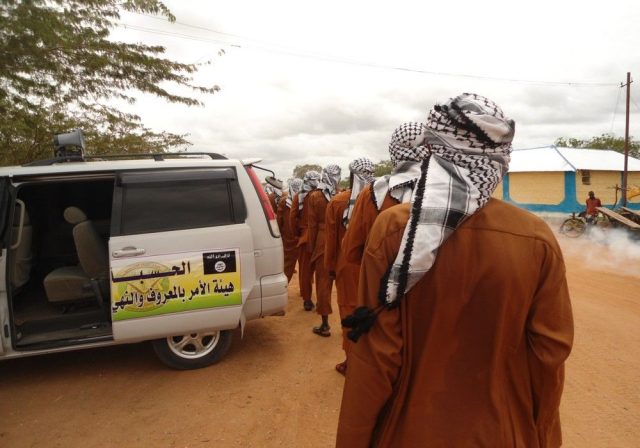
Al-Shabaab Aims for ‘Hearts and Minds’ With Establishment of Islamic Police Force
Publication: Terrorism Monitor Volume: 14 Issue: 17
By:

Al-Shabaab, the al-Qaeda affiliate in Somalia, claims to have established a religious police force in an area it controls in southern Somalia, seeking to push forward its Islamist agenda even as it struggles to hold on to its territory in the face of the advance of African Union (AU) troops.
Al-Shabaab has lost a great deal of territory to the Somali National Government forces and the troops of the AU mission in Somalia (AMISOM) over the years, but it continues to control parts of southern Somalia (Horseed Media, May 6).
While some analysts suggest that contradictory policies and AMISOM’s own inefficiencies have sustained the conflict and even bolstered al-Shabaab, the group has nonetheless suffered heavy losses at the hands of better-armed AMISOM troops and struggled with internal differences (Herald, May 17). The establishment of the new (so-called) Islamic police, or Hisba, is yet another indication that the group is far from defeat.
Islamic ‘Police Force’
The Hisba officers were first sighted in Jilib, the most populous town in Somalia’s Middle Juba region and currently the group’s political and military headquarters, on August 9. Photographs released by the group through its mouthpiece Radio Andalus showed men in uniform with ID cards and branded vehicles on patrol in the city (Hiraan Online, August 9).
From Jilib, al-Shabaab hopes to deploy the force across the areas it controls, including Juba, Gedo, Lower Shabelle, Middle Shabelle, Bay and Bakool, Hiraan, and Galgudud in southern Somalia.
News of the Hisba’s establishment followed the release on July 12 of the first audio message – entitled “Sharia or Martyrdom” – from Sheikh Ahmad Umar Abu Ubaidah, the leader or emir of al-Shabaab (see Terrorism Monitor, August 5).
That Umar felt compelled to release the message at all suggests morale among the militant group was low. Through his message Umar sought to inspire his forces. While the audio recording was aimed at the fighters, the message sent by the establishment of the Hisba force is clearly intended for the public in the regions al-Shabaab controls.
The establishment of the new force is intended to win the movement public support in those areas by highlighting its role in the dispensation of justice.
Seeking Public Support
According to the group, the force will be unarmed, but it will work as part of the commission for the promotion of virtue and prevention of vice and seek to “encourage” morality among Somali citizens.
The Hisba will carry out its work under the group’s strict interpretation of sharia. Its main task is providing moral guidance in line with Islamic teachings, and al-Shabaab has made clear the new force can be expected to arrest and even behead those engaging in the consumption and sale of alcohol. The group has also made clear the force will carry out harsh punishments including cutting-off men’s penises as a punishment for adultery, stoning to death promiscuous women, and amputating the hands of those caught stealing. Those wearing Western clothes regarded un-Islamic will also be detained. It will also protect the quality of food, medicine, and clothing in the market (Zipo, August 10).
This is reminiscent of group’s early activities from 2006-2009, when it stormed through central and southern Somalia and implemented a strict form of sharia, cutting-off limbs, stoning women to death, and caning others who broke its religious laws (Standard, September 27, 2014). In those days, the group even carried out double amputations – cutting-off the arms and legs of people suspected of stealing people’s property in Southern Somalia (Hiiran Online, June 22, 2009). This harsh dispensation of justice reduced crime with brutal efficiency, but this came at a huge cost to personal and social freedoms (SomaliaReport , January 24, 2012; Somalia Report, December 4, 2011).
Jilib as a Strategic Stronghold
In many ways, the Hisba is not a new phenomenon; the militants themselves have carried out such duties in the past (Tuko, August 9). In regions where the government has no administrative control (such as Jilib), al-Shabaab continues to conduct its sharia courts, run schools, manage a taxation system, and install its own governors (Zipo, August 10).
Jilib became al-Shabaab’s de-facto base in 2015, after the group was forced out of Bardheere, its operation and logistical headquarters, and Dinsoor, its political center, by AMISOM troops (Tuko, July 24, 2015; Horseed Media, July 24, 2015).
Jilib, with its population of 45,000, is a commercial town located on the main road from Mogadishu’s south to the port city of Kismayu. Once the headquarters of Islamic Courts Union, the Islamist movement from which al-Shabaab splintered amid the Union’s defeat in 2006, Jilib’s location allows al-Shabaab to access the Indian Ocean through secret routes. Through these routes, it receives contraband, including arms, and new recruits.
Jilib is described as vast, flat agricultural zone that ensures access to food for the group, and it provides them with a tactical advantage. AMISON forces and their international partners recently increased aerial bombardment of the city with a view to weakening the movement (Intelligencebriefs, August 26, 2015). Hundreds of fighters are believed to have been killed in the attacks, which have been carried out mainly by the Kenya Defense Forces.
Potential for Local Appeal
With the announcement of its new police force in Jilib, al-Shabaab is seeking to strengthen its grip on the city, one of its few remaining strategic strongholds, by creating a force that can easily engage with the public, maybe even winning over public opinion and furthering public support for the group.
Judging by the group’s past success in combating crime, it is possible the new force will have some appeal at a local level.
Meanwhile, the heavy public promotion of the new Islamic police force will likely encourage further sustained attacks by AMISOM and its partners, who will be wondering at al-Shabaab’s confidence in heralding the establishment of such a unit.





